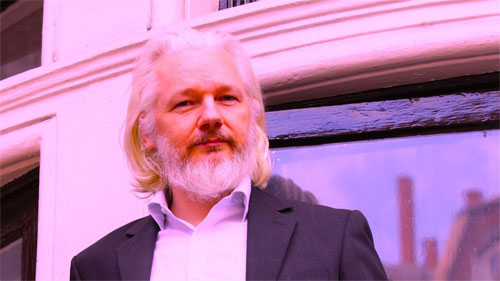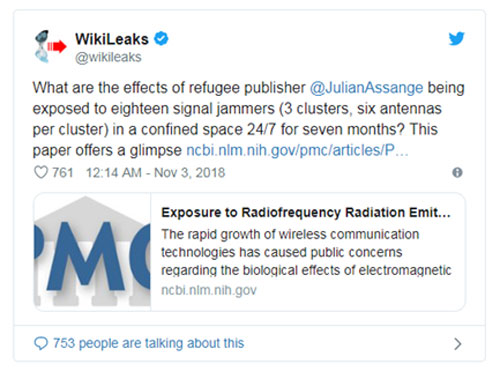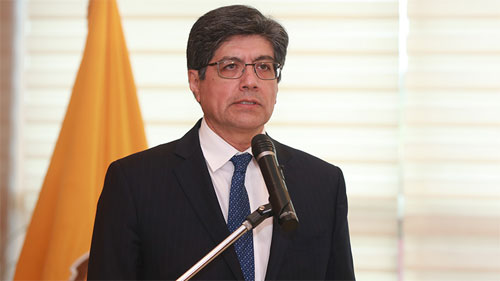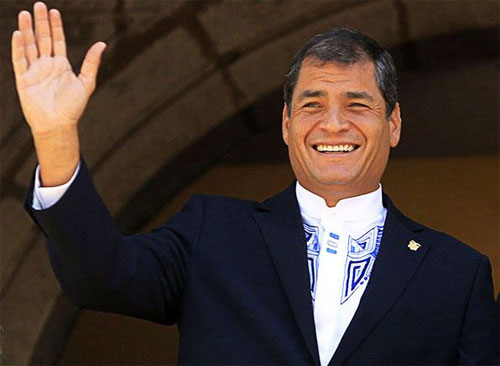WikiLeaks Julian Assange Emergency Unity4J Vigil for Rumors of Expulsion
Ed. Note:
The following article was published on April 7, 2019, in Activist Post. Since then, on April 11, Assange was arrested by British Police and expelled from the Ecuador Embassy in London. At the moment we publish this, Assange is incarcerated in the maximum security London’s Belmarsh Prison, serving a 50-week sentence (given to him on May 1, 2019) for jumping bail in 2012. He is also being
held
pending an extradition request by the United States, over allegations he conspired with former US military analyst Chelsea Manning to download classified databases in what the US justice department called “one of the largest compromises of classified information in the history of the United States”.
Ecuador President Alleges Hacking
The Ecuadorian President Lenín Moreno has accused WikiLeaks founder Julian Assange of hacking him, despite the embassy taking away Assange’s rights to access internet and other forms of communication a year ago, in March, making it impossible for him to hack anyone, Associated Press reported.

Julian Assange
In the wake of allegations of corruption by the Moreno government, the President of Ecuador has decided to distract from his own scandal by blaming Assange for the leak. Consortium News reported Ecuadorian President Lenín Moreno’s use of the scandal to deflect his own problems and move to evict Assange.
Moreno has accused WikiLeaks of leaking documents allegedly implicating him and his family in a corruption scheme with a Panamanian investment firm, INA Investments Corp. WikiLeaks has denied being behind the leaks and no documents related to the scandal appear on its website. Moreno said the alleged leak by WikiLeaks is a breach in a “protocol” with Assange that allows him to remain in the London embassy in exchange for his public silence on all political matters. Assange has never agreed to the protocol. His social media accounts were shut down by Ecuador in March 2018.
Moreno ironically somehow seems to have got WikiLeaks and the CIA confused when he accused the journalism institution without evidence of intercepting phone calls and private conversations as well as “photos of my bedroom, what I eat, and how my wife and daughters and friends dance.” All things possible that were revealed by the Vault 7 leaks and Edward Snowden’s own disclosures about spying.
WikiLeaks Responds
WikiLeaks in a statement called Moreno’s charges “completely bogus,” stating they reported on the accusations of corruption against the president only after Ecuador’s legislature had said he was being investigated.
“If President Moreno wants to illegally terminate a refugee publisher’s asylum to cover up an offshore corruption scandal, history will not be kind,” WikiLeaks said in a statement.
Ecuadorian lawmaker Ronny Aleaga received a dossier anonymously filled with documents that could implicate Moreno and his family in alleged crimes of – corruption, perjury and money laundering. So it’s no wonder that he wants to distract to Assange.
The INA Papers
The documents are known as the “INA Papers” linking Moreno and a Chinese company Sinohydro that built the Coca Codo Sinclair hydroelectric dam, which, according to the lawmaker, deposited US$18 million in the offshore company Recorsa, teleSUR reported.
Later, a top official said while Ecuadorian President Lenín Moreno was angered by the apparent hacking of his personal communications, he denied WikiLeaks’ claim and said no decision had been taken to expel Assange from the embassy.
The official spoke on the condition of anonymity because he wasn’t authorized to discuss the matter.
However, there have been claims by the Daily Mail that UK police have, in relation to the operation to arrest Julian Assange, “rented an apartment overlooking the Embassy’s front door to keep the building under constant surveillance.”
WikiLeaks, Julian Assange and 7 Years of Illegal Detainment
WikiLeaks has consistently highlighted that its founder and former editor Julian Assange has been arbitrarily detained 8+ years without charge by the UK Govt (6+ years within the Ecuador Embassy in London where he was granted asylum from U.S. threats) and 2 years house arrest, despite two UN rulings stating he should be allowed to walk free.
The mother of Julian Assange, Christine, WikiLeaks, and Unity4J (a grassroots movement in support of Assange) are calling for protests to bring light to Assange’s current plight and gather at the Ecuadorian Embassy in London and number 3, Hans Crescent.
In November of last year, Christine Assange used Unity4J to urge officials to allow access to medical attention for her son, and for the UK and Ecuador to end Assange’s illegal detainment that is heading into the 9th year (2 years of virtual house arrest, into 7th year confined inside the Ecuadorian embassy) without charge as determined by the UN. For the past 7 years in the embassy, the UK government has refused Assange’s request for access to basic health needs: fresh air, exercise, sunshine for vitamin D and access to proper medical and dental care according to Christine Assange and Julian Assange’s lawyer, Greg Barns.
As a result, his health has seriously deteriorated; and his examining doctors warn these detention conditions are life-threatening.
“The slow and cruel assassination is taking place before our very eyes in the embassy in London,” Christine expressed.
Assange’s doctor, Sean Love, has previously stated in an opinion piece that depriving him of medical care is “cruel, inhuman and degrading treatment.” Adding “It is time for Australia to intervene.”
Other doctors who examined Assange, Sondra Crosby, an associate professor at Boston University’s school of medicine and public health, and Brock Chisholm, a clinical psychologist in London have stated much the same.
All three called on safe passage for Assange to a hospital in an article for the Guardian, where they wrote: “While the results of the evaluation are protected by doctor-patient confidentiality, it is our professional opinion that his continued confinement is dangerous physically and mentally to him and a clear infringement of his human right to healthcare.”
The above health concerns are coupled with surveillance technology that was a requirement for Assange to remain in the embassy, including signal jammers and all of the additional technology that is emitting various electromagnetic waves.

Assange’s doctors most recently examined him in December of last year, warning about the ongoing dangers to his health.
A lawyer for Assange stated last year he did not know the results of the medical tests, while further calling on Ecuador to produce documentation proving that the UK would not extradite Assange to any country where his life would be at risk. Most notably, an at-risk country would be the United States, which WikiLeaks noted just tortured a former CIA agent and suspected alleged WikiLeaksVault 7 leaker Joshua Schulte by bolting him to the floor, video-monitoring and strip-searching him. Assange’s supports fear: “if we are being honest, if they got their hands on Assange, would probably do much of the same except 100x worse to the WikiLeaks founder for exposing numerous crimes by the U.S. government through various releases over the years.”
“We insist that they show us the letter from the United Kingdom,” Assange’s lawyer, Carlos Poveda said. Adding, “the protocol is meant to set the rules of his living situation, but it seems more like a penitentiary regime.”
Charges Dropped Years Ago
Allegations against Assange in Sweden have long been dropped, and he is facing only a minor infraction in the UK for failing to turn up to a court hearing, a police bail warrant. The warrant issued in question arose 12 days after Julian entered the Ecuador Embassy seeking asylum from U.S. threats against his life and liberty. So that warrant should never have been issued in the first place, as Asylum/international law overrides domestic (UK) law.
Instead, the bail warrant should have been dropped after Sweden dropped its preliminary investigation and Julian wasn’t charged as the warrant was attached to the European Arrest Warrant on that case.
In October of last year, WikiLeaks tweeted that Ecuador was being pressured to end Assange’s asylum and citizenship so he can be arrested by British police and extradited to the U.S. to presumably face charges under the Espionage Act — the federal law often used to punish whistleblowers. This is due to the fact that under the Ecuadorian constitution extradition is forbidden.
Also taking place in October, lawyers for Julian Assange — specifically, Baltasar Garzón, a lawyer for WikiLeaks — also sued Ecuador, accusing the government of violating Assange’s “fundamental rights and freedoms.”
WikiLeaks claims Assange’s access to the outside world has been “summarily cut off” and stated Ecuador has threatened to remove all protection given to his person that he has been granted when he was accepted into a political asylum if he doesn’t abide by Orwellian guidelines.
Lawyers for Assange have said they will also challenge the legality of the Ecuador government’s “special protocols,” which make his political asylum contingent upon “censoring” his own freedom of opinion, speech, and association, as well as violate Assange’s property and his visitors without any just warrant.
UK Acting as USA Police Force
Britain is far from providing “sufficient guarantees.” In fact, the UK’s Foreign Secretary, Jeremy Hunt, dared Assange to walk out of the Ecuadorian embassy last year.
He further let comments slip alluding to an active investigation when he said that Assange was facing “serious charges.” That article was then deleted and absent from News.com.au’s website and others, Activist Post reported.
In November, the U.S. accidentally revealed sealed charges it had against Assange, so it’s a far-fetched lie to state “Assange won’t be extradited to face the death penalty.” The truth is no one knows what the U.S. has planned for Assange if somehow they got their hands on him in a U.S. court. Who knows what the sentencing would be. What’s for certain is that they would surely try to make an example out of him.
Near-Liberty
One month later in December, Ecuador’s President Lenín Moreno made comments on a radio interview stating that “Britain had provided sufficient guarantees that the WikiLeaks founder won’t be extradited to face the death penalty abroad in the U.S.,” Associated Press reported.
Moreno further added that a deal had been reached between London and Quito to allow Assange to leave. “The way has been cleared for Assange to take the decision to leave in near-liberty,” Moreno said, failing to expand on what exactly “near-liberty” means in context. One can only speculate what that means for Assange … and it’s not good news.
Assange denied the agreement through his lawyer, Barry Pollack, who told The Telegraph that the “deal was not acceptable.”
The facts are contrary to what Moreno stated; the real truth is that Ecuador is trying to sell out Assange in a “deal” with the U.S. for debt relief loans, as WikiLeaks tweeted.
Ecuador’s immediately former president responds to New York Times report that his successor offered to sell WikiLeaks publisher Julian Assange to the U.S. government in exchange for debt relief. Subsequently Ecuador received $1.1 billion from US controlled banks.
“The only deal is between Ecuador and the United States – to sell Assange for loans. The UK is repeating, as it always has, the standard EU policy of asking the US for life in prison instead of death. That’s no deal. Ecuador fabricates the claim to lay the ground for expulsion”, said WikiLeaks.
That effort to evict Assange has since been ramping up and now it seems to have reached a boiling point. Former NSA whistleblower Edward Snowden noticed the interesting timing of a tweet by the Foreign Minister of Ecuador Jose Valencia, tweeting “about mechanisms for unilaterally revoking asylum claims.”
The Ecuadorian Foreign Minister then erased three tweets related to Julian Assange sent at 7:14am according to CNN’s reporter in Quito.

The Foreign Minister of Ecuador Jose Valencia
In June 2018, a letter to UK Home office Member of Parliament Zac Goldsmith revealed that the government would not confirm whether it has received an extradition request from the U.S. until Assange is arrested in relation to that request according to Assange Legal.
As such, the Trump administration is threatening to step over a never-crossed line – applying the secret documents provision of the Espionage Act to journalistic practices, according to the EFF (Electronic Frontier Foundation), which in 2017 condemned the threats of prosecution against WikiLeaks and Assange.
Former CIA torture whistleblower John Kiriakou explains what would happen if Assange was extradited to the U.S. and why he would never stand a chance in the rigged Washington courts: “No one has ever won an Espionage Act case.”
Demands to Trump to Unseal All Charges
Assange’s situation is getting worse with each passing day between his health and the isolation without charge, which according to Human Rights Watch General Counsel Dinah PoKempner his conditions to stay at the embassy are looking more and more like solitary confinement. Assange has been barred from visitors and prevented internet access for almost a year, while he has never been allowed to exit the embassy for some sunshine.
Earlier this year, lawyers for Julian Assange filed an urgent application to the Inter-American Commission of Human Rights (IACHR), based in Washington D.C., to demand the Trump Administration unseal the charges it has secretly filed against Assange.
The Australian activist’s lawyers are further asking the Commission to compel Ecuador to cease its espionage activities against Assange, to stop the isolation imposed on him and to protect Assange from U.S. extradition.
The request was a whopping 1,172-page application for “precautionary measures” directed at the Inter-American Commission of Human Rights.
Assange’s lead international coordinator lawyer, Baltasar Garzón, is requesting that the IACHR make an urgent intervention in favor of Assange and is calling for “international solidarity for this case in which the right to access and impart information freely is in jeopardy.”
“The revelation that the U.S. has initiated a prosecution against Assange has shocked the international community,” the legal submission states. The U.S. government “is required to provide information as to the criminal charges that are imputed to Assange in full,” it adds.
The application also alleges that U.S. prosecutors have begun approaching people in the U.S., Germany, and Iceland and pressed them to testify against Assange in return for immunity from prosecution.
Those approached, it is said, include people associated with WikiLeaks’ joint publications with other media about U.S. diplomacy, Guantánamo Bay and the wars in Iraq and Afghanistan.
It’s worth noting that this is corroborated by an article in Icelandic media interviewing the new Editor In Chief of WikiLeaks, Kristinn Hrafnsson, who told the publication that Iceland authorities offered him immunity from prosecution in exchange for testifying against Julian Assange, according to a translated article. However, translating articles can always be faulty, but Hrafnsson’s quote appears to state that he isn’t the person who was interrogated and offered immunity.
“I can confirm from the first hand that this has been done. No one has contacted me this way. However, I myself am investigating this issue and I know that data has been downloaded to a private company with secrecy”, says Kristinn.
Assange’s lawyers say the Trump administration has pressured Ecuador to hand over Assange. In December, The New York Times reported that Ecuador’s new president, Lenín Moreno, tried to negotiate handing over Assange to the US, in exchange for “debt relief.”
In 2017, Moreno vowed to stop Assange from revealing further corruption about the United States for the duration of his stay at the embassy, stating he would “gag Assange from revealing further corruption about the U.S.”
Although Moreno claimed to support Assange’s asylum, he previously said that he would ask him to “be very delicate when he addresses international politics, especially regarding countries with which we have good relations,” reported Latin American news outlet teleSUR.
However, his behavior since and recent statements seem to show differently.
UN and Former Ecuador President criticizes US, Ecuador and UK
In the past 48 hrs, two UN officials have criticized the U.S., Ecuador and the UK for potential human rights violations expressing worry for Julian Assange.
Both the Special Rapporteur on the right to privacy, Joe Cannataci, and UN Special Rapporteur on torture Nils Melzer have expressed alarm to the situation at hand as WikiLeaks’ journalist who worked on all current releases Stefania Maurizi tweeted.
Cannataci plans to meet the WikiLeaks founder on the 25th of April to investigate the situation himself.
Even the former President of Ecuador Rafael Correa is stating his country must protect Julian Assange as an Ecuadorian citizen, since Assange received Ecuadorian citizenship last year.

Former President of Ecuador Rafael Correa
In December 2018, the UN Working Group on Arbitrary Detention, together with the UN Special Rapporteur on the situation of Human Rights Defenders, called on all states to implement the Working Group conclusions of 2016 to set Assange free, adding: “It is time that Mr. Assange, who has already paid a high price for peacefully exercising his rights to freedom of opinion, expression and information, and to promote the right to truth in the public interest, recovers his freedom.”
WikiLeaks as a whole has recently faced increased pressure from authorities. In 2017, the U.S. Senate considered a bill that would classify WikiLeaks as a “non-state hostile intelligence service” bundled as part of the 2018 Intelligence Authorization Act. Presumably, that classification would authorize the use of force against WikiLeaks and presumably its supporters.
Then, in late December of 2017, the Head Legal Office in Madrid of former judge and WikiLeaks’ chief counsel, Baltasar Garzón, was raided by masked men dressed in all black and the security cameras were taped. Despite the break-in, nothing was taken and the operation was referred to as being “professionally done” by police.
Why is Julian Assange Detained?
The U.S. has been on a relentless crusade against WikiLeaks since May 2010 and considers Julian Assange’s arrest a priority, while several politicians have threatened Assange’s life. It has been almost 9 years now since Assange was arrested and detained under one form or another, with 2 years of virtual house arrest, and almost 7 years confined inside the Ecuadorian embassy and now he can add unjustified solitary confinement to the long laundry list.
The international non-profit whistleblowing organization has leaked at least 10 million classified documents to date from various governments including the United States. In 2016, the group published a number of documents and emails from the Democratic National Committee (DNC) and Hillary Clinton’s campaign chair John Podesta that suggested the DNC deliberately tried to discredit presidential candidate Bernie Sanders over then-Democratic nominee Hillary Clinton.
As both the current and former administrations continue forward with an ongoing nine-year investigation into WikiLeaks since their 2010 leak of almost 100,000 State and Defense Department secret documents dubbed Cablegate pertaining to U.S. military operations in Iraq and Afghanistan, neither administration has been able to charge a single member of WikiLeaks with a criminal indictment.
In that case, only the alleged source of the leak was punished: former U.S. intelligence analyst Chelsea Manning, who spent seven years in prison before former U.S. President Barack Obama commuted 28 years of her 35-year sentence on his way out of office, calling it “very disproportionate relative to what other leakers have received” and that “it makes sense to commute and not pardon her sentence.”
Now, Chelsea Manning is back in prison in solitary confinement for refusing to testify against WikiLeaks and Julian Assange, despite the Fifth Amendment stating that no person can be tried twice for the same crime.
The Fifth Amendment reads in part: “nor shall any person be subject for the same offense to be twice put in jeopardy of life or limb.” This is known as the Double Jeopardy Clause.
In a Twilight Zone meets George Orwell’s 1984, it’s interesting to note the EU is trying to pass an Orwellian law disguised as a copyright initiative which would silence publications like WikiLeaks and stifle the free and open Internet, as well as freedom of information with link taxes and an upload filter, as Activate Now reported.
Further, in what can be described as absolute hypocrisy, the UK and Canada launched a global campaign to “defend media freedom.” In irony, they also nominated WikiLeaks’ and Julian Assange’s lawyer Amal Clooney, the wife of actor George Clooney to be the Special Envoy for Media Freedom.
Maybe they should think about Julian Assange’s “media freedom”?
What’s next for Julian Assange?
If Assange is allowed to be extradited to the U.S. and charged under the Espionage Act, government corruption and criminality will no doubt rise due to journalists being afraid to report crimes in the media.
So far, an open letter to U.S. President Donald Trump on behalf of Assange published by DefendWikiLeaks calling to close the Grand Jury investigation and drop any charges planned against any member of WikiLeaks has received 4,479 signatures of everyone from journalists, and academics, to activists in Assange’s defense.
yogaesoteric
June 30, 2019
